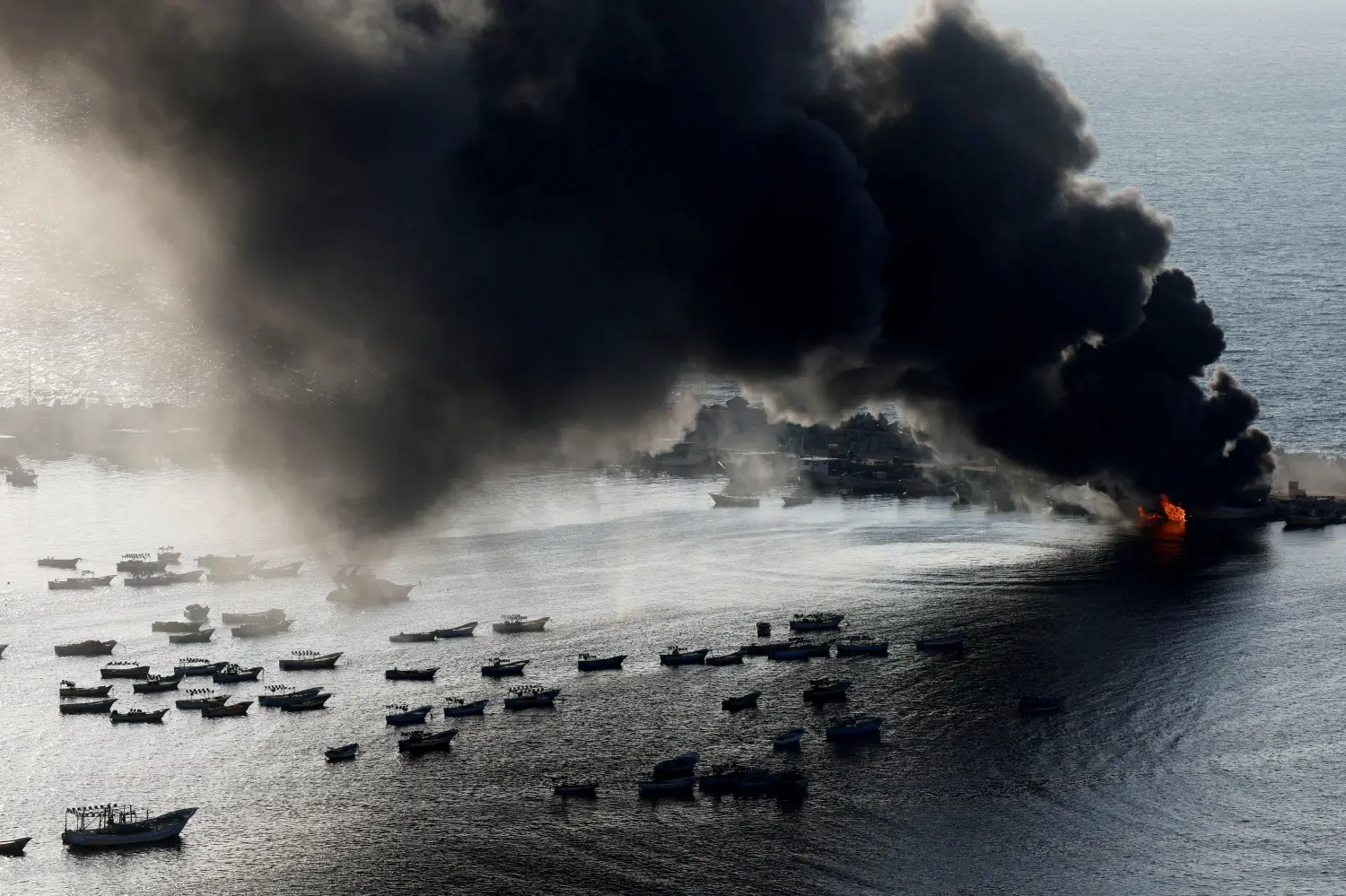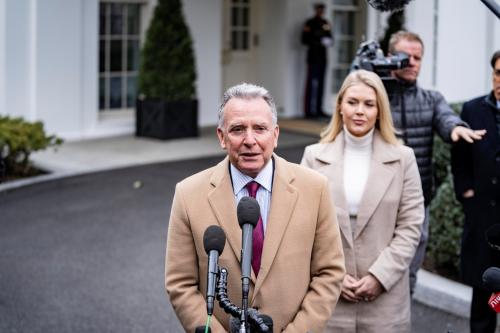Brookings scholars offer their insights following Iran’s drone and missile attack against Israel on April 13, 2024. Their responses provide perspectives on the implications for various actors as well as a range of policy issues.
Middle East
Natan Sachs
Three historic events happened Saturday night. First, the long-simmering Iran-Israel war became an overt and direct military confrontation for one night at least. Iran’s dramatic attack was large-scale and complex, including drones and cruise and ballistic missiles aimed at two Israeli military bases.
Second, a regional security concept long in the making became a reality. U.S. Central Command—which since 2021 has included Israel in its area of responsibility—had worked to foster cooperation between the United States and regional partners, Israeli and Arab. Jordan joined Western allies on Saturday, intercepting a swarm of drones that overpassed its territory, and other Arab states provided intelligence.
Third, Israel’s own aerial defense was remarkably successful. Alongside the Iron Dome system for short-range projectiles is a wider anti-missile array, including the Arrow 3 high-altitude anti-ballistic missile system, as well as the intermediate-range David’s Sling. This array is today a central element in Israel’s security posture, in practice if not in official doctrine. It accords Israel the strategic leeway to weigh its options far more patiently than it would have if the attack had been successful.
The remarkable success of the international defense effort and Israel’s own systems offers an opening to the U.S. administration to pressure Israel to pause with any major response, as is evident from administration messaging. The Biden administration has been working tirelessly since October 7 to prevent regional escalation and in this aspect at least, has had notable success. An Israeli response will come, and it might come soon, but there’s a chance at least that it appears to return to the confounds of the evident-yet-deniable Iran-Israel war that existed before Saturday.
Suzanne Maloney
The long-standing “shadow war” between Iran and Israel burst into the spotlight over the weekend, as Tehran launched a massive barrage of drones and missiles in its first-ever direct attack on Israeli territory. The world breathed a collective sigh of relief—first when the attack failed to cause significant damage or casualties and subsequently as it appeared that the Biden administration had succeeded in forestalling an immediate Israeli retaliation.
The escalation came in response to an audacious Israeli airstrike on Iran’s consulate in Damascus that killed seven senior Iranian military commanders, including Mohammad Reza Zahedi, the clerical regime’s key interlocutor with the Lebanese Shia militia Hezbollah and its wider network of proxy militias. Through its funding, training, coordination, and supply of weaponry, Iran has long utilized these proxies as its “axis of resistance” to sow instability across the Middle East and wage a surrogate war on its adversaries, especially Israel. The willingness of Iran’s leadership to undertake such a high-risk operation to avenge Zahedi’s death underscores the centrality of these proxies for Iran’s power projection, as well as the regime’s increasingly confrontational posture over recent years.
Several factors prevented further escalation in the immediate wake of the attack, including clumsy Iranian efforts to signal that their intent was limited, energetic U.S. diplomacy to marshal an effective regional effort in defense of Israel, and perhaps most importantly, some luck. Unfortunately, the lull in the crisis is unlikely to hold for long. The specter of future Iranian drone and missile barrages will harden Israeli determination to go on the offensive against Tehran. And now that Iranian leaders have overcome any prior restraint around attacking Israel directly, they will be tempted to try it again.
Itamar Rabinovich
In the aftermath, and in fact during, Iran’s abortive attack on Israel, the Israeli government, the national security community, and the media have been divided over the issue of Israel’s response to the massive, unprecedented assault. A majority of the cabinet members wanted to retaliate in kind. Their main argument was the need to maintain (or restore) Israel’s deterrence. Some of them had threatened such a response prior to the anticipated attack and they were also clearly reluctant to be seen as having issued hollow threats. Others argued that Israel’s achievement (shared with the United States and regional actors) was so impressive that Israel could rest on its laurels and wait for a suitable opportunity to settle the score with Tehran, rather than enter a vicious cycle of blow and counter-blow with Iran on top of the war in Gaza and the war of attrition with Hezbollah.
On Monday night, Israel’s war cabinet decided on a “clear and decisive” response to the Iranian attack. The precise meaning of this choice of words will have to be clarified in the coming days but it has already raised tensions in the region. Netanyahu needs to take President Joe Biden’s pressure to refrain from a direct attack on Iran into account and he will probably try to find a mode of action that would enable him to deal with the cross pressures exerted on him.
This turn of events further compounds the rich and difficult agenda facing Israel: to complete the war in Gaza with an apparent achievement, to settle the issue of the hostages, to end the war of attrition along the Israeli-Lebanese border, to return the more than 150,000 displaced Israelis to their homes in the north and the south, and above all deal with the full-fledged Iranian challenge.
In this context, the successful joint effort by the United States, Israel, and several regional actors provides an excellent starting point for expanding and formalizing their cooperation. This could provide a satisfactory exit strategy from the war in Gaza and a response to Iran’s success in building a bloc of radical proxies and dependent states. The main challenge to this strategy remains the need to revive cooperation and dialogue between Israel and the Palestinian Authority.
Marsin Alshamary
Iran’s efforts to restore deterrence after Israel attacked its consulate in Damascus have reinvigorated its allies and proxies across the Middle East. It has also inadvertently foreshadowed the positions of regional actors, should a larger war unfold. Many countries in the region showed that they were not willing to sacrifice their relationship with the United States. Indeed, despite that most recent analysis has focused on the Gulf and Jordan (given the latter’s active role in shooting down Iranian drones), Iraq’s position is worth noting. The Iraqi security forces did not shoot down any Iranian drones, but they did not prevent the United States from doing so on Iraqi territory.
This is part of a drawn-out balancing act by the administration of Prime Minister Mohammed Shia al-Sudani, who is set to visit Washington today, April 15. Sudani’s administration, like previous Iraqi administrations, has had the unenviable position of having to balance Iranian and American rivalries on its soil. Since October 7, Sudani’s administration had struggled to control the Islamic Resistance in Iraq, an umbrella of armed groups that had exchanged retaliatory attacks with the United States in Iraq and Syria. After a worrisome flurry of activity, Sudani had succeeded in dissuading those actors from attacking Americans, who were in Iraq at the country’s invitation.
This fragile equilibrium may now be disrupted by Iran’s attack, as these armed groups had been satisfied simply with Iran’s tacit approval and are now receiving much stronger signals from Tehran. At the same time, Tehran’s response is a measured and deliberate one, intended to preserve Iran’s dignity without provoking war with a regional nuclear power backed by a superpower. Iran’s proxies in the region have also historically delivered deliberate responses, similarly with enough forewarning to allow their opponents to prevent serious damage.
Vanda Felbab-Brown
As the world exhibits relief that Iran’s attack on Israel caused almost no damage and awaits Israel’s response, there is a chance to avoid a broader regional war. In shooting off a barrage of missiles against Israel, Iran changed the unwritten Middle East rules that limited its armed actions to be conducted predominantly through its militia proxies. But the ineffectiveness of Iran’s salvo, with the vast majority of the missiles, rockets, and drones interdicted by Israel’s aerial defense systems or shot down by the United States, the United Kingdom, Jordan, and France, is likely to reinforce Iran’s determination to cling to and perhaps expand its proxy militias to conduct asymmetric warfare.
Iran’s attack and the likely lesson it will draw from its failure coincide with the visit of Iraqi Prime Minister Mohammed Shia al-Sudani to Washington. On top of the agenda are critical negotiations over the status of U.S. forces in Iraq. In the fall and winter of 2023, pro-Iran Iraqi militia groups mounted many attacks against U.S. bases and other assets to drive the U.S. military out of Iraq. Washington may seek to trade sanctions relief on these militias and Iraqi politicians to hang onto its military presence in Iraq, crucial also for sustaining its special operations forces presence in Syria. Maintaining U.S. military bases in Kurdistan is also important for counterterrorism and Iran intelligence gathering.
But much as Washington hopes that Sudani can help rein in the pressure from the pro-Iran militias (and Iran), Sudani came to power with their backing. The governing Shia Coordination Framework, with intimate ties to the militias, has been centralizing power and asserting dominance against the Kurdish and Sunni ethnic minorities, systematically weakening them politically, economically, and legally. While Sudani himself may seek a more balanced foreign policy that is not solely an expression of Iran’s desires, the militia power that underpins his government has amassed more power than ever before. The ineffectiveness of Iran’s military attack will likely reinforce desires in Tehran to get the U.S. military out of Iraq.
William A. Galston
As Israel struggles to settle on a plan to successfully end the war in Gaza, the last thing it needs is a wider regional conflict. As it happens, the same is true for President Joe Biden, whose handling of foreign conflicts has earned poor marks from the electorate. These coinciding interests help explain why he was successful in persuading Prime Minister Benjamin Netanyahu not to retaliate against Iran, at least for now.
Aided by its allies, Israel’s multitiered air defense system performed successfully under pressure, preventing loss of life and limiting damage to the country’s military infrastructure. This outcome should mute public pressure for retaliation, strengthening the hand of Israel’s war cabinet in the face of strident statements from more extreme members of Netanyahu’s coalition. Itamar Ben-Gvir demanded that Israel “go crazy” and set aside allegedly antiquated concepts such as restraint and proportionality, and other right-wingers followed suit. Fortunately, cooler heads prevailed, at least in the immediate aftermath, giving Israel the opportunity to gain a public relations advantage and regain some of the international support it has lost since October 7. Whether Israel will seize this opportunity remains in doubt.
Strategic patience can give Israel time to build on one of the most significant lessons of the past two days: alliances with Western powers and regional partners can boost Israel’s security. There is a price to be paid, of course; alliances mean taking the advice and interests of other countries into account, making it impossible to shape policy purely on the basis of domestic political considerations. For any Israeli prime minister other than Netanyahu, this would be a price worth paying.
Sharan Grewal
This weekend, Iran directly attacked Israel for the first time in history, in retaliation for Israel’s strike on Iranian generals in Damascus on April 1. Despite its unprecedented nature, Iran’s attack was seemingly intended more as a show of force, similar to its reaction after the assassination of General Qassim Soleimani. Its slow-moving drones and missiles gave Israel and its allies hours to prepare and caused minimal damage. Nonetheless, Iran’s attack has produced symbolic gains, improving its image among certain Arab publics and putting Jordan in the uncomfortable position of helping to defend Israel.
Keen to not be dragged into a regional war, President Joe Biden has urged Israel not to retaliate and warned that the United States will not take part in any offensive operations against Iran. But Israel has snubbed U.S. presidents before: in recent years, undermining the Iran nuclear deal, seizing land in the West Bank, and restricting humanitarian aid into Gaza. Indeed, Israel’s incentives today may very well be to escalate: a tit-for-tat with Iran could distract international attention away from its potential war crimes in Gaza, reframe the narrative of Israel again as a victim, and rekindle its international support. While Israel cannot afford to devote its full attention to Iran while it remains mired in Gaza, it has incentives to gradually escalate the conflict with Tehran.
In the short term, Israel may be able to drag Biden into begrudgingly supporting an escalation. But in the long-term, doing so could also accelerate the generational shift viewing Israel as a strategic liability for the United States.
Jaganath Sankaran
In the prelude to Iran’s attack, Israeli leaders were debating the possibility of a devastating war. One Israeli source told Israel’s Ynet news that if the conversation between the moderates and aggressive factions of Israel’s political leadership before the strike had been broadcast, “four million [Israelis]” would be “trying to find a way to escape.”
Two factors may have prevented a war. First, the impressive performance of Israel’s air and missile systems, augmented by the United States, has dampened the political pressure for a prompt response. Israel has publicly claimed a 99 percent interception rate. However, it may be lower. Reportedly, 50 percent of 120 ballistic missiles that Iran launched may have failed. Of the remaining, nine ballistic missiles appear to have hit military targets including the Nevatim Air Base. Yet, given the scale of the attack, Israel’s defenses have served it well.
Second, American behind-the-scenes diplomacy distancing the United States from Israel’s assassination, along with European states privately urging Iranian restraint, may have induced Iran to de-escalate temporarily. Iran’s attack, arguably a performative act, seems to have chosen to avoid mass civilian casualties.
Israel and Iran can now claim victory and disengage. Israel can declare its success in defeating a massive aerospace strike. Iran can declare that it has reminded Israelis of the death and destruction a full-scale attack targeting cities might cause. Israel’s defense minister, Benny Gantz, has now declared that Israel would “exact the price from Iran in the way and at the time we see fit.” The statement suggests a pause. Hopefully, the decision sticks.
Domestic and economic policy
Aslı Aydıntaşbaş
President Joe Biden’s first “bear hug” of Prime Minister Benjamin Netanyahu in the aftermath of October 7 was intended to show U.S. support for Israel while quietly urging restraint, and it failed. With tens of thousands of lives lost and a humanitarian crisis in Gaza that turned much of the global public against Israel, the gentle whisperings from the U.S. president went unheeded.
As the Middle East seems to be sliding closer to a war in the aftermath of this weekend’s Iranian attacks on Israel, will the Biden administration’s second “bear hug” fare any better? Over the weekend, the United States and its Western allies have stood firmly with Israel, shooting down 99 percent of Iran’s well-telegraphed barrage of drone and missile attacks and reassuring the Israeli public that the U.S. commitment to Israel’s security is “ironclad.”
But privately, the administration is worried that Israel could respond in ways that draw the United States into a war—and is once again urging caution.
Thus far, Washington’s behind-the-scenes advice has been ineffective when it comes to Israel’s national security decision-making and there is no reason to believe Bear Hug 2 will be more successful than the first. The region’s fate is in the hands of Netanyahu and his cabinet. Israel’s April 1 strike on the Iranian consulate in Damascus is an indication that Israeli leaders want to take this fight directly to Iran and its regional proxies.
If Washington is interested in preventing that scenario, it needs to go beyond private diplomacy and team up with key allies, including Arab states, to publicly pressure Israel and Iran to de-escalate and lay down its own redlines for an Israeli retaliation. It also needs to secure an immediate and permanent cease-fire in Gaza.
Sarah A. Binder
Iran’s unprecedented attacks could spur congressional efforts to bolster aid for Israel. But it’s no sure bet.
The Senate has already passed a $95 billion bill that includes aid for Ukraine, Israel, Taiwan, and Gaza. But in the House, Speaker Mike Johnson (R-La.) has dallied for months and refused to act.
Johnson has two options.
First, the gravity of the attack could convince Johnson to bend to bipartisan and international pressure to advance the Senate bill. The Iranian strikes could provide Johnson with the political cover necessary to buck the half of his party opposed to aiding Ukraine. President Joe Biden would then sign the bill into law.
Is the attack on Israel sufficient to remake aid politics inside the divided House Republican Conference? That’s not clear. Johnson has shown little appetite to swallow the Senate bill. Instead, he has vowed to make the bill more palatable to his right flank—perhaps loaning aid to Ukraine and sweetening the measure with conservative riders. The more Johnson tampers with the Senate bill, however, the less likely House Democrats will vote for it and the more likely Senate Democrats will kill it.
Second, if Johnson is unable to patch his conference divide, he could exploit the crisis for partisan gain. Republicans could unify around “messaging” bills. Such measures would likely send aid to Israel but not Ukraine, drop humanitarian aid for Gaza, and be opposed by almost every Democrat. Dead on arrival in the Senate? For sure. But Republicans could take credit, castigate Biden, and blame Democrats.
E.J. Dionne, Jr.
Iran’s foiled attack on Israel did what Israel currently could not have done itself: It united Israel’s traditional allies and even the leaders of some Sunni nations in opposition to their regional foe. It moved attention, for the short-term at least, away from the war in Gaza and toward the larger Iranian threat. Iran seemed to try to limit the attack’s political impact by telegraphing it in advance, but its action creates an opportunity for Israel to refurbish its standing with traditional allies—including the Biden administration—that are increasingly critical of Israel’s conduct in the war in Gaza.
President Joe Biden has made clear that the United States wants Israel to “take the win” and limit its response. This creates a moment of truth for the Israeli government, but also for Republicans in the U.S. House of Representatives.
In Israel, there will be a fierce debate between the centrist members of the country’s war cabinet, who see an opportunity to recalibrate relations with the United States and other allies, and right-wing members of Prime Minister Benjamin Netanyahu’s government who favor a broad assault on Iran. And it will be a testing time for House Speaker Mike Johnson, who will be deciding between bringing a bill to the floor offering aid to Israel alone or agreeing to the Senate bill (or something similar) that combines assistance to Israel with much-needed aid to Ukraine. Perhaps paradoxically, events in the Middle East may create the decisive moment in the U.S. debate over Ukraine.
Gian Maria Milesi-Ferretti
The economic repercussions of the escalation of Iran-Israel tensions will depend crucially on whether such tensions abate or whether they escalate further—and are in any case subject to great uncertainty given the variety of scenarios that could play out. If tensions abate, the direct economic repercussions may be modest at a global level. If tensions escalate, the shock to economies in the region as well as to the global economy could be sizable.
Repercussions for the Middle East, particularly for the most vulnerable countries, would be dire, adding to what is already a very difficult situation. Repercussions beyond the Middle East could materialize through several channels. These include:
- Higher oil prices: these would complicate the disinflation process underway around the world, with central banks facing at the same time a further inflationary shock and a negative shock to economic activity through higher production costs. This can be particularly costly for those emerging markets and developing economies that are large energy importers—several of which already face difficult economic conditions (Pakistan is one case that comes to mind). Higher oil prices would also benefit Russia, which relies on oil exports for a substantial share of its external revenues.
- Further disruptions to international trade: Houthi attacks have already caused disruptions and higher shipping costs for goods trade reliant on shipping through the Red Sea. These disruptions could intensify and extend to shipping through the Strait of Hormuz. As is the case for higher oil prices, this would raise inflation pressures and negatively affect economic activity.
- Higher global risk aversion: Market reactions to heightened uncertainty and global tensions typically include flight to safety—investors demand safe assets and currencies (U.S. Treasuries, Swiss franc) and shun riskier financial instruments. In turn, this raises the cost of financing for riskier borrowers—from smaller firms to emerging and developing economies facing financial difficulties.
David Wessel
As with any attempt to forecast the impact of an event as significant as the escalation of Israel-Iran tensions, the right answer is: It depends. It depends on what tomorrow brings. If Israel and Iran step back from the brink, the economic effect will be modest; if they don’t, well, it’ll be worse. That said, a few early thoughts:
- This will not help bring U.S. inflation down to the Federal Reserve’s 2 percent target. Oil prices rose last week, and they are likely to remain elevated and even climb with any hints that the weekend’s events are just the beginning. Houthi attacks in the Red Sea already have driven up shipping costs; these are not likely to retreat.
- Economies are driven by decisions that people make—consumers and businesses. Anything that shatters consumer confidence or what John Maynard Keynes called “animal spirits” will tend to restrain spending and investment. A hot war in the Middle East, especially if accompanied by headline-making setbacks in Ukraine’s efforts to resist Russian aggression, can only make people more cautious. If everyone gets cautious at once, the economy slows.
- One persistent feature of the global economy is that when the world looks scary, global investors buy U.S. Treasury debt. So, much like we saw on Friday, anxiety about the Middle East is likely to restrain recent increases in the yield on U.S. Treasury debt and maybe even pull down those yields, a plus for the world’s leading borrower (the U.S. government) and for Americans shopping for mortgages.
Eurasia
Madiha Afzal
Iran’s unprecedented direct attack on Israel this weekend occurred three months after another Iranian attack—one on its neighbor to the east, Pakistan. Iran’s strikes on Pakistan in January, themselves unprecedented, were only tangentially related to the ongoing conflict in the Middle East but sparked concerns about the conflict extending to South Asia. Pakistan was outraged at the “unprovoked” strikes, which targeted militant sanctuaries in its restive Baluchistan province and killed two children. It retaliated less than two days later.
Pakistan views the Iranian strikes on Israel differently. It called the April 1 attack on the Iranian consulate in Syria a “major escalation” and sees the Iranian strikes as the result of a “breakdown of diplomacy.” It has joined calls for de-escalation.
While Iran and Pakistan’s tit-for-tat strikes ended their crisis within days, and the two countries reverted to referring to their “brotherly” ties shortly thereafter, the aftermath of this weekend’s attack—an Iranian barrage of 300 missiles and drones aimed directly at Israel—is unlikely to be resolved so quickly.
President Joe Biden has urged restraint and said that America will not participate in any offensive attacks on Iran. Israel has said it will respond in a time and manner of its choosing. All eyes are now on what that response will be, and whether the region will erupt into further violence and a wider war. But one thing is clear in the meantime: Iran’s attack has already diverted focus away from the terrible conflict and ongoing humanitarian catastrophe in the Gaza Strip.
Pavel K. Baev
Russia’s reaction to the sharp escalation of hostilities in the Middle East amounted to a mere expression of concern combined with yet another condemnation of Western imperialism, and this attempt at distancing itself from the troubles is unsatisfactory for all stakeholders—and even for Moscow itself. Israel is disappointed that the Russian appeal for restraint comes with a reminder about its transgression of diplomatic conventions in the strike on Damascus on April 1. Iran has reasons to expect that its expansion of military ties with Russia warrants a stronger show of solidarity. China used to appreciate Russia’s skills at manipulating Middle Eastern conflicts by pretending to establish goodwill with the warring parties and now observes Moscow’s awkward inability to make any difference. Moscow has invested significant political capital and military resources in building influence in the wider Middle East, and now finds its opinion irrelevant. President Vladimir Putin imagined himself a master of cultivating personal relations with difficult autocrats—but the Kremlin telephone lines are silent.
Even the price of oil—a bonus Russia always expects from the tensions in the Gulf—hasn’t shown any inclination to rise. On top of all these setbacks, a major negative impact could be the long-delayed and now urgent vote in the U.S. Congress on the aid package for Israel and Ukraine. Ukrainian President Volodymyr Zelenskyy wasted no time pointing out that the Shaheed-136 drones intercepted by the Israeli Iron Dome system are the same projectiles that are aimed at Odesa and Kharkiv every night, and this simple point might tip the balance of doubts.
Ryan Hass
Beijing responded to the Iranian attack on Israel by calling for “relevant parties to exercise calm and restraint to prevent further escalations.” China’s Foreign Ministry spokesperson also urged the end of conflict and called on “countries with influence” to play a constructive role in advancing peace and stability in the region.
At the United Nations, a Chinese representative used Iran’s attack as validation of Beijing’s earlier warnings that the prolongation of conflict would exacerbate tensions and generate “spillover effects.” China’s representative described Israel’s April 1 airstrikes on Iran’s diplomatic premises in Syria as “of an extremely vicious nature.” Chinese officials also reiterated Beijing’s support for a two-state solution.
Beijing’s response to this latest round of attacks is emblematic of its broader approach to the Israel-Gaza conflict and the broader region since Hamas’s attack on Israel on October 7. Beijing continues to seek to own the moral high ground, urging calm and restraint and encouraging peace but without putting diplomatic muscle or strategic leverage behind such calls. China seems to see more value in calling out the United States and Israel than it does in utilizing its unique influence to solve problems or prevent future ones from emerging. Beijing does not view unfolding events in the region as directly threatening its vital interests. Unless or until that calculus changes, expect Beijing to continue to try to remain above the fray, privileging virtue signaling and leaving the hard work of trying to limit the spread or escalation of violence to others.
Tanvi Madan
The recent escalation of Iran-Israel tensions has made India’s Middle East balancing act even trickier. New Delhi said it was “seriously concerned” about the situation after the Iranian attack on Israel, and called for “immediate de-escalation” and “exercise of restraint.” Foreign Minister S. Jaishankar also spoke to his Israeli and Iranian counterparts. India had already issued a travel advisory on April 12 for Iran and Israel and is likely to continue to consult and coordinate with its partners, including the United States. Reportedly, it has also hit pause on sending additional workers to Israel (part of a recent government-to-government agreement).
Jaishankar’s readout of the conversation with the Iranian foreign minister reiterated the need for restraint. That was missing in the readout of the call with his Israeli counterpart—but also missing thus far, strikingly, has been an Indian condemnation of the Iranian attack on Israel.
Beyond India’s broader equities with Iran, there might be two other reasons for that posture. New Delhi rarely criticizes a partner publicly—also evident in its response to the Russian invasion of Ukraine—but, it had been “distressed” about the April 1 attack on the Iranian consulate in Syria due to fear of further escalation. Without naming Israel, it had urged countries to “avoid actions that go against commonly accepted principles and norms of international law.”
A second sensitivity might be Tehran’s detention of 17 Indian nationals who had been part of the crew of a commercial ship seized by Iranian troops on April 13.
The need to ensure their safety and release only adds to the other reasons for Indian anxiety about further escalation and regional conflagration: its various partnerships in the region, millions of its citizens resident in the Middle East, energy interests, maritime security, and the economic impact. All this occurring just before India goes to the polls will also add a political filter to the Indian government’s prism.
Andrew Yeo
On Sunday, the South Korean government “strongly condemn[ed] the large-scale attack on Israel by Iran” and urged all parties to exercise restraint. South Korea’s response echoes that of other U.S. allies in Asia denouncing Iran, including Japan and Australia. It also underscores the emerging geopolitical blocs between U.S. allies, on the one hand, and the China-Russia-Iran-North Korea axis on the other hand, although those blocs may not be as straightforward when considering South Korea’s relations with Iran and Israel, respectively, over the past decade.
South Korea’s case is particularly interesting as Seoul is recalibrating its relationships in the Middle East. A decade earlier, bilateral relations between South Korea and Iran held much promise. South Korea, once a major buyer of Iranian crude oil, was Iran’s third-largest import partner from 2015 to 2018.
Tensions grew, however, when South Korea froze $7 billion of Iranian funds in 2019 after the reinstatement of U.S. sanctions against Iran. Relations deteriorated further in 2021 when Iran seized a South Korean tanker in the Strait of Hormuz.
As ties worsened with Iran, South Korea boosted its economic and political ties with the United Arab Emirates (UAE) and Saudia Arabia, which are now Seoul’s two largest trading partners in the Middle East. Seoul has been cautious in overtly supporting Israel with rising death tolls among Palestinian civilians but also possibly due to the 46 memorandums of understanding and contracts signed between South Korean businesses and the Saudis in October 2023. While Seoul quickly condemned Hamas after the October 7 attacks, an open declaration of support for Israel did not follow. Although President Yoon Suk Yeol and Prime Minister Benjamin Netanyahu met on the sidelines of the United Nations General Assembly last September, to date, no South Korean president has made a state visit to Israel.
Last year, Yoon referred to Iran as the UAE’s “enemy,” and drew a parallel between threats from Iran and North Korea. North Korea supports Hamas and Iranian proxies such as Hezbollah and the Houthis. One might anticipate closer ties between South Korea and Israel following Iran’s attack. Then again, the geopolitics of the Middle East often defy the logic of simple bloc politics.
The Brookings Institution is committed to quality, independence, and impact.
We are supported by a diverse array of funders. In line with our values and policies, each Brookings publication represents the sole views of its author(s).


























Commentary
The impact of Iran’s attack on Israel
April 15, 2024